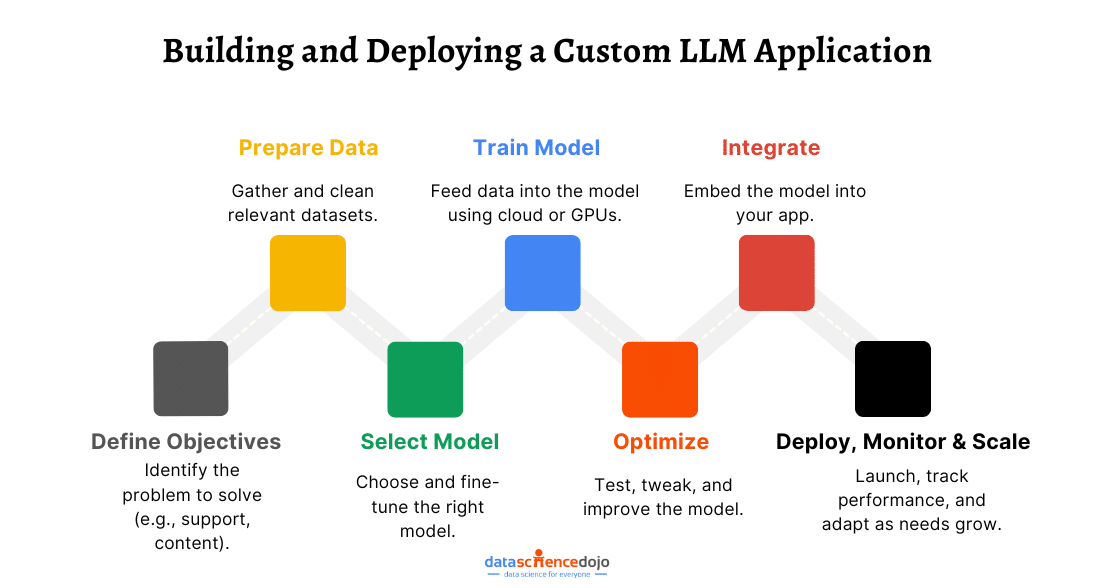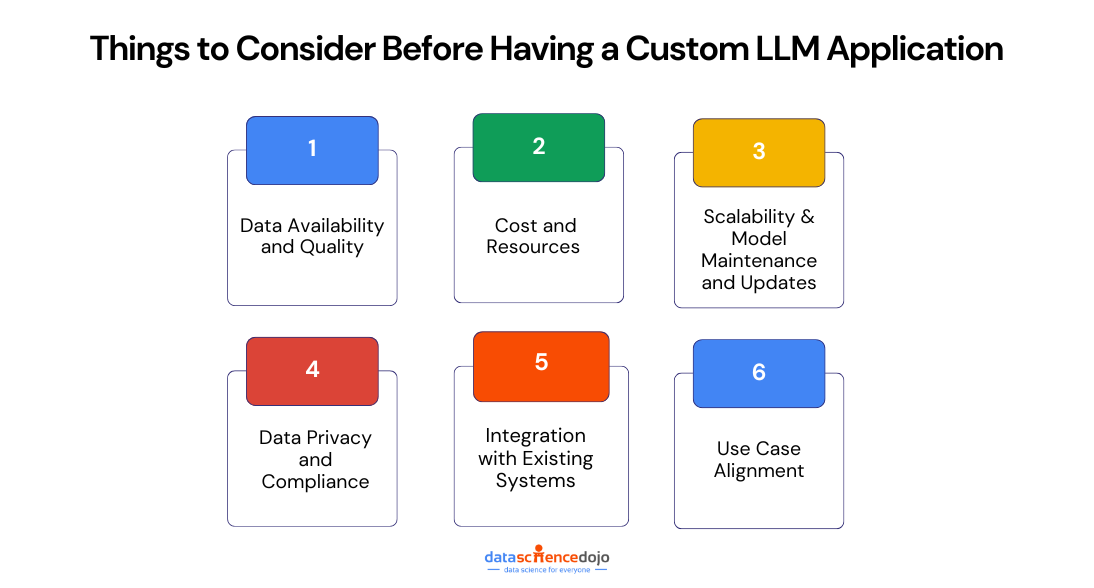In the age of artificial intelligence, Large Language Models (LLMs) are revolutionizing the way businesses operate. While many companies leverage general-purpose LLMs, there is s a growing demand for custom solutions that are fine-tuned to specific organizational needs. Deploying custom LLM applications can enhance everything from customer support and content creation to data analysis and decision-making processes.
This blog will guide you through the process of developing and deploying custom LLM applications, focusing on practical strategies, potential benefits, and the key steps involved. Whether you’re looking to optimize your operations or explore innovative use cases, understanding how to tailor an LLM to your specific requirements is the first step towards harnessing its full potential.
Why You Must Get a Custom LLM Application for Your Business
In today’s competitive landscape, using a general-purpose LLM might not fully address your business’s unique needs. Custom LLM applications, however, can help you gain a significant edge by tailoring the model to your specific requirements. Here’s why investing in one is essential for your business:
1. Tailored Accuracy
A custom LLM is trained on your business data, making it more relevant and precise. Unlike general models, which may offer broad or generic responses, a customized solution is designed to understand your industry, customers, and processes. This leads to more accurate results that better serve your specific use cases.
2. Enhanced Efficiency
Custom LLMs help automate tasks that are specific to your operations, freeing up valuable time. Whether it’s handling customer inquiries or processing internal data, these models can execute complex functions more efficiently than manual processes, allowing your team to focus on higher-value tasks.
3. Better Customer Experience
By using a custom LLM, you can create more personalized interactions with your customers. Whether it’s a chatbot that understands your product line deeply or a recommendation system that knows your customer preferences, tailored LLM applications ensure that every touchpoint feels relevant and thoughtful.
4. Improved Data Privacy
Security is a priority, especially when dealing with sensitive information. Custom LLMs allow you to control how your data is processed, ensuring that it remains within your secure infrastructure. This is particularly important for industries that need to comply with strict data protection regulations.
5. Scalability and Flexibility
As your business grows, so do your needs. A custom LLM can adapt and scale alongside your organization, evolving with new data and changing business objectives. Unlike off-the-shelf solutions, custom models are built to grow with you, ensuring long-term relevance.
Common LLM Applications
Custom LLM applications can be leveraged in a variety of ways to transform your business operations. These applications are designed to meet specific needs, enhancing productivity, customer engagement, and data analysis. Here are some common and impactful uses of custom LLMs:
1. Chatbots and Virtual Assistants
Custom LLMs can power chatbots and virtual assistants capable of understanding and responding to natural language. These AI-driven solutions improve customer service by providing immediate, accurate responses, and they can automate repetitive tasks like handling inquiries, booking appointments, or offering product recommendations. This not only boosts customer satisfaction but also frees up valuable resources.
2. Content Generation
Content creation is another area where custom LLMs shine. Whether it’s generating blog posts, marketing copy, technical articles, or even creative formats like poetry and code, custom LLMs can produce high-quality content at scale. This can save businesses considerable time and money, while ensuring consistency and relevance in the content being created.
3. Language Translation
For businesses expanding into international markets, custom LLMs can facilitate seamless communication by providing accurate and context-aware translations. These models can handle complex language pairs and nuances, making it easier to engage with global customers, translate documents, and localize websites.
4. Sentiment Analysis and Text Classification
Custom LLMs excel at analyzing large volumes of text to classify it by sentiment or topic. This capability is invaluable for businesses looking to understand customer feedback, monitor social media sentiment, or identify emerging trends. Additionally, LLMs can help automate document classification, making it easier to manage large datasets and streamline operations.
How to Build and Deploy a Custom LLM Application
Once you understand the benefits of custom LLM applications and the different ways they can transform your business, the next step is learning how to build and deploy one. The process involves a series of critical steps, from planning and data collection to training and integration. Here’s a breakdown of how to approach building and deploying a custom LLM application that’s tailored to your business needs:
1. Define Your Objectives and Use Case
Before diving into the technical details, it’s essential to clearly define the objectives of your custom LLM. What specific business problem do you want to solve? Whether it’s improving customer support, automating content generation, or enhancing data analysis, having a well-defined use case will guide the entire development process. This ensures that the custom LLM is built to address your unique challenges and goals effectively.
2. Gather and Prepare Your Data
The next crucial step is to gather relevant data for training your custom LLM. The quality and specificity of the data you collect directly affect the performance of the model. You’ll need to curate datasets that represent your business context—such as customer interactions, product catalogs, or industry-specific content. It’s equally important to clean and preprocess this data to remove any inconsistencies and ensure it’s structured in a way that facilitates optimal learning.
3. Select the Right Model Architecture
Choosing the right architecture is key to building an effective custom LLM. Depending on your needs, you might opt for pre-trained models like GPT-3, BERT, or T5, which can be fine-tuned for your specific tasks. Fine-tuning a pre-trained model is generally the most efficient option, as it leverages the vast amount of knowledge these models have already acquired. However, in some cases, you may need to build a model from scratch if your requirements are highly specialized.
4. Train the Model
Training the custom LLM involves feeding your cleaned and prepared data into the model so it can learn patterns and relationships relevant to your business. This stage is resource-intensive and may require powerful computing resources such as GPUs or cloud-based services (e.g., AWS, Google Cloud, or Microsoft Azure). The training process can take time, but it’s essential to ensure that the model learns to generate the most accurate outputs for your specific needs.
5. Evaluate and Optimize the Model
Once your custom LLM has been trained, it’s crucial to evaluate its performance. This typically involves testing the model with a separate dataset to assess how well it generalizes to new, unseen data. Common evaluation metrics include accuracy, precision, recall, and relevance to your business context. If the model’s performance falls short, you may need to fine-tune it further by adjusting hyperparameters or expanding the training dataset.
6. Integrate the Model Into Your Application
After optimizing the LLM, the next step is integrating it into your business application. Whether it’s a chatbot, content generator, or data analytics tool, the model should seamlessly interact with your existing systems. This might involve developing APIs that connect the LLM to other business software, ensuring smooth data flow and operational efficiency.
7. Deploy and Monitor the Model
Deploying the model to production is the final step in the development process. This is where the model is made available for real-world use, either via cloud platforms or on-premises infrastructure. However, deployment is not the end of the process. Regular monitoring is essential to track performance, address issues, and continuously improve the model based on user feedback and real-world data. Ongoing model maintenance will help ensure it remains accurate and effective over time.
8. Scale and Iterate
As your business evolves, so should your custom LLM. Ensure that your deployment infrastructure can scale with increasing data, new use cases, and changing business needs. Additionally, an iterative approach to development is crucial. Continuously retraining the model with fresh data, refining its capabilities, and adapting to new challenges will ensure that your custom LLM remains a valuable tool for the long term.
Things to Consider Before Having a Custom LLM Application
While custom LLM applications offer significant advantages, there are several important factors to consider before implementing one in your business. These considerations will help ensure that the application is effective, secure, and aligned with your goals. Here are some key points to keep in mind:
1. Data Availability and Quality
The effectiveness of a custom LLM heavily depends on the quality and quantity of data used to train it. You need to ensure that you have access to high-quality, relevant data that reflects your business’s needs. This could include customer interactions, industry-specific documents, or proprietary datasets. Poor or biased data can lead to inaccurate or unreliable model performance, so data curation and preparation should be a priority.
2. Cost and Resources
Developing and maintaining a custom LLM application can be resource-intensive, both in terms of time and money. It involves costs for data collection, model training, and continuous optimization. You’ll also need to invest in the right hardware and software infrastructure, and possibly hire AI specialists to build and fine-tune the model. It’s important to assess your budget and resource allocation to ensure that the investment aligns with your business’s capabilities and long-term goals.
3. Scalability
As your business grows, so will your needs. When designing a custom LLM, consider how well it will scale with increased data and expanding business operations. The model should be adaptable, allowing for easy updates and retraining as your business evolves. This will ensure that the LLM remains valuable and relevant over time without requiring major overhauls.
4. Model Maintenance and Updates
LLMs require ongoing maintenance to stay accurate and functional. This includes regular updates to improve performance, handle new data, and address any emerging issues. Make sure you have a plan in place for model monitoring and maintenance, including setting aside resources for retraining the model and fine-tuning it as needed to reflect changes in your business environment.
5. Data Privacy and Compliance
For many businesses, particularly those in highly regulated industries, ensuring data privacy and compliance is a major concern. When using custom LLMs, it’s essential to ensure that your model is built in a way that meets privacy regulations like GDPR or HIPAA. Custom LLMs should be developed in a secure environment, and sensitive data should be handled carefully to avoid breaches or misuse.
6. Integration with Existing Systems
Consider how the custom LLM will integrate with your existing software and business processes. Whether it’s a CRM, ERP, or any other business system, the LLM needs to work seamlessly within your current technological ecosystem. Plan for smooth integration to avoid disruptions and ensure that the LLM can enhance existing workflows without causing inefficiencies or compatibility issues.
7. Use Case Alignment
Not every business problem requires an LLM solution. Before developing a custom model, ensure that the use case justifies the investment in a custom AI system. For example, if your business needs to automate simple tasks or provide basic customer support, a general-purpose AI tool may suffice. Custom LLMs are best suited for complex, industry-specific challenges where tailored solutions can provide significant value.
Enterprises Using Custom Large Language Models
Many leading enterprises across various industries are adopting custom Large Language Models (LLMs) to streamline operations, improve customer engagement, and unlock new capabilities. These businesses are leveraging the power of LLMs to gain a competitive edge and meet specific needs that go beyond the capabilities of off-the-shelf solutions. Here are some notable examples:
1. Healthcare: IBM Watson Health
IBM Watson Health uses custom LLMs to assist healthcare providers in diagnosing diseases, personalizing treatment plans, and analyzing large volumes of medical data. The model is trained to understand medical terminology and research papers, helping professionals stay up-to-date with the latest findings and improve patient care. By tailoring the LLM to the healthcare industry, IBM ensures that it delivers highly relevant, accurate insights.
2. E-commerce: Amazon
Amazon uses custom LLMs for a range of applications, including product recommendations, customer service automation, and content generation. The company’s LLMs are trained on massive datasets specific to the e-commerce space, enabling them to understand customer preferences, predict buying behavior, and enhance the overall shopping experience. These custom models allow Amazon to stay ahead of competitors by offering highly personalized interactions.
3. Finance: JPMorgan Chase
JPMorgan Chase employs custom LLMs to automate processes such as analyzing financial reports, responding to client inquiries, and processing transactions. By fine-tuning their models to handle complex financial jargon and data, the company improves operational efficiency and provides better services to their clients. Custom LLMs also help the bank detect fraud and ensure compliance with regulatory standards.
4. Technology: Microsoft
Microsoft uses custom LLMs within their Azure cloud platform to offer AI-powered solutions to businesses. These models are designed to provide specific services like customer support, data analysis, and content creation, tailored to the unique needs of different industries. With custom LLMs, Microsoft enables businesses to enhance their digital transformation and optimize their operations across various sectors.
5. Media & Entertainment: Netflix
Netflix leverages custom LLMs to enhance its recommendation engine and improve content curation. The model is trained on user preferences and viewing history to offer personalized movie and show recommendations. By customizing the LLM, Netflix ensures its algorithms can better predict what users will enjoy, keeping subscribers engaged and satisfied with relevant content.
Conclusion
Custom Large Language Models (LLMs) offer businesses a powerful way to enhance efficiency, improve customer engagement, and drive innovation. By carefully defining your objectives, gathering quality data, and following a structured approach to development—ranging from model training to integration and deployment—you can create tailored AI solutions that meet your specific needs.
While building and deploying a custom LLM requires thoughtful planning and ongoing optimization, the long-term benefits of a scalable, industry-specific application are well worth the effort. It’s essential to consider factors like data privacy, integration, and scalability to ensure your model delivers lasting value.
With the right strategy, custom LLMs can transform how your business operates, providing a competitive edge in an increasingly AI-driven world.






